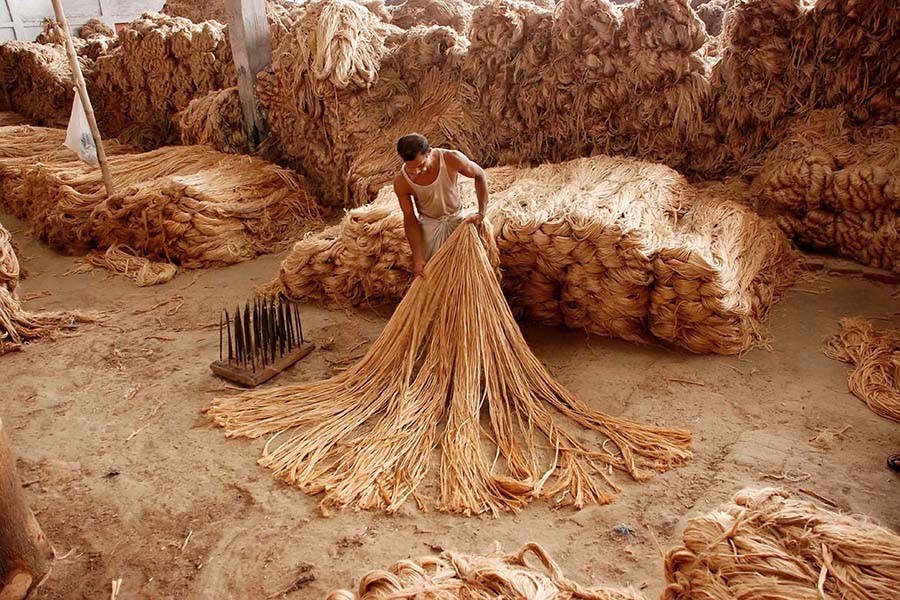Proper policy support and adjustment of fiscal burden could help the jute sector become one of the important economic growth drivers of the country, said economist Dr Hossain Zillur Rahman on Wednesday.
"Jute will become one of the important growth drivers of our economy, if there are proper policy support and adjustment of fiscal burden in a coordinated way," he said.
"At present we can see a 'third wave' with jute as an economic growth driver. Jute is not only our past glory but also is our golden future," he said.
His observations came at a seminar on "Diversification of jute for development of the jute industry" organised by Dhaka Chamber of Commerce and Industry (DCCI) at its auditorium in the city.
"We need to facilitate new growth drivers like jute besides readymade garment (RMG) sector," said Mr Rahman who was an adviser to a caretaker government.
He said jute could play an important role in driving up the growth of gross domestic product (GDP) to 8.0 per cent and attaining the status of middle income country.
"Bangladesh is making progress in jute diversification gradually, but the important part is proper government policy framework," said Mr Rahman who is also executive chairman of the Power and Participation Research Centre (PPRC).
"The world is concerned about climate change and it has created a new window of opportunity for us," he said.
He said there are many challenges to tapping the real prospects of jute.
"We should unlock our policy making for development of jute sector," he said.
The other speakers at the seminar called for a clear roadmap for development of the jute sector.
They suggested financial support from the government to encourage the jute entrepreneurs.
They also said 'Jute Paper Act' could be beneficial for the entrepreneurs of this sector.
DCCI President Abul Kasem Khan called upon the government to formulate a law that will help the jute pulp paper industry flourish.
"It is established now that Bangladesh can produce good quality pulp from jute and from this pulp best quality paper can be produced. In this regard, we request the government to formulate a 'Jute Pulp Paper Act' soon," he said.
"World market for jute bag will reach US$2.6 billion by 2022. Bangladesh can use this opportunity," he suggested.
State Minister of Textiles and Jute Mirza Azam said the former BNP government at the advice of the World Bank has destroyed the country's jute sector.
He said that jute would be included in the category of agriculture products so that the jute producers could get financial incentives from the government.
He said 40 million people of the country directly or indirectly depend on the jute sector. The government has enacted the 'Jute Packaging Act' and because of this Act, production of raw jute in the country is increasing every year and jute farmers are getting the desired prices also.
Jute production was 6.5 million bales in 2014. It increased to seven million bales in 2015, 8.5 million in 2016 and 9.2 million bales in 2017, he added.
The entrepreneurs are producing 240 types of jute products in the country against 135 last year.
Mr Azam emphasised the need for creating skilled workforce for the jute sector and extensive research on it.
He called upon the entrepreneurs to make jute bags at competitive prices so that people could easily use jute bags instead of polythene bags.
"To create skilled workforce the government has established 12 textile institutes and six textile colleges in the country," he mentioned.
Bangladesh Jute Mills Corporation (BJMC) Adviser (Research) Babul Chandra Roy said Bangladesh every year imports viscose worth US$700-800 million and this viscose is made of wood. He said the country has the potential to produce viscose from jute.
Dr. AFM Akhtaruzzaman said that there should be coordination between the forest research institute and the jute research institute.
He also called for a long term policy support from the government.
BJMC Chairman Dr. Md. Mahmudul Hasan said laboratory tests have confirmed that pulp can be produced from jute, but "Now we need to conduct feasibility study to determine its commercial possibility."
He also said by 2021 "We will be able to export jute and jute goods worth US$5-7 billion."
Convenor of DCCI Special Committee on Jute Diversification and Managing Director of Creation Pvt. Ltd. Rashedul Karim Munna in his keynote paper said Bangladesh now exports jute and jute goods worth US$1.0 billion.
"If we get proper policy guidelines, jute export will increase up to US$5-7.0 billion," he said.
Besides, he said, "We have to use modern technology in jute mills as well as modern machinery to compete in the international market."
He also stressed product development, market development, value addition and diversification.
He said if the government gives special incentives and financial support, more entrepreneurs will enter this business.
Bangladesh earned US$962.42 million from jute goods export during the fiscal year 2016-17 against $918 million in the FY 2015-16.
Director of Jute Research Institute Dr. Md. Abul Kalam Azad, director general of Jute Department Shamsul Alam, secretary of Bangladesh Jute Association A Barek Khan, president of Jute Goods Exporters Association and former senior vice-president of DCCI M S Shekil Chowdhury and former directors of DCCI Ahmed Hossain Majumder, AKD Khair Mohammad Khan, DCCI Convener MS Siddiqui, DCCI Director SM Zillur Rahman and entrepreneur Shapon Kumar Das, among others, were present.


